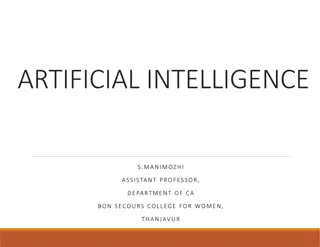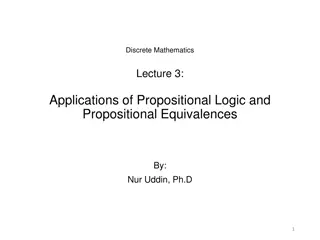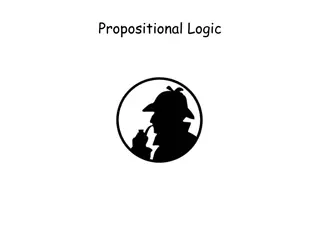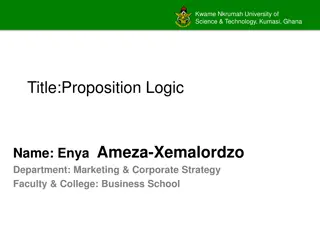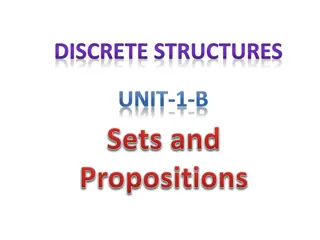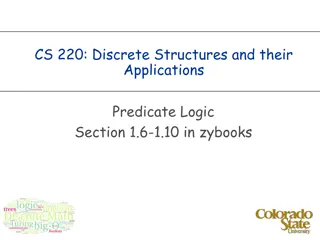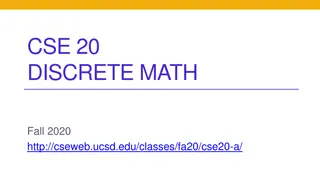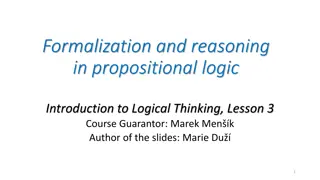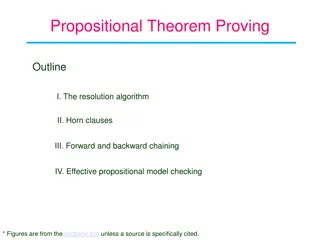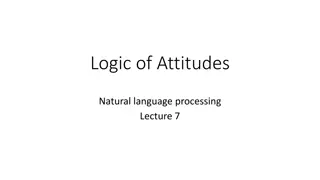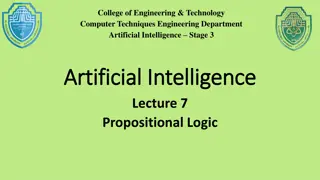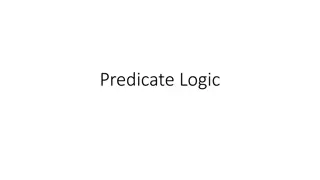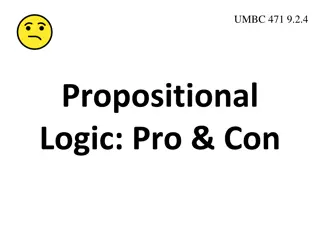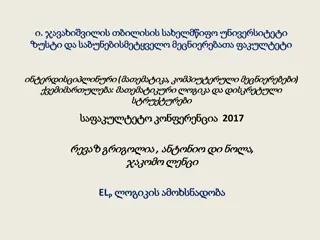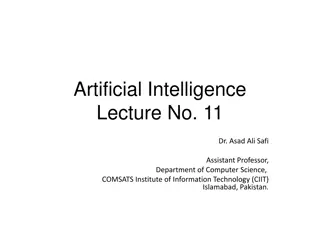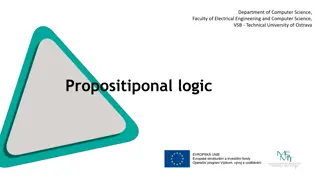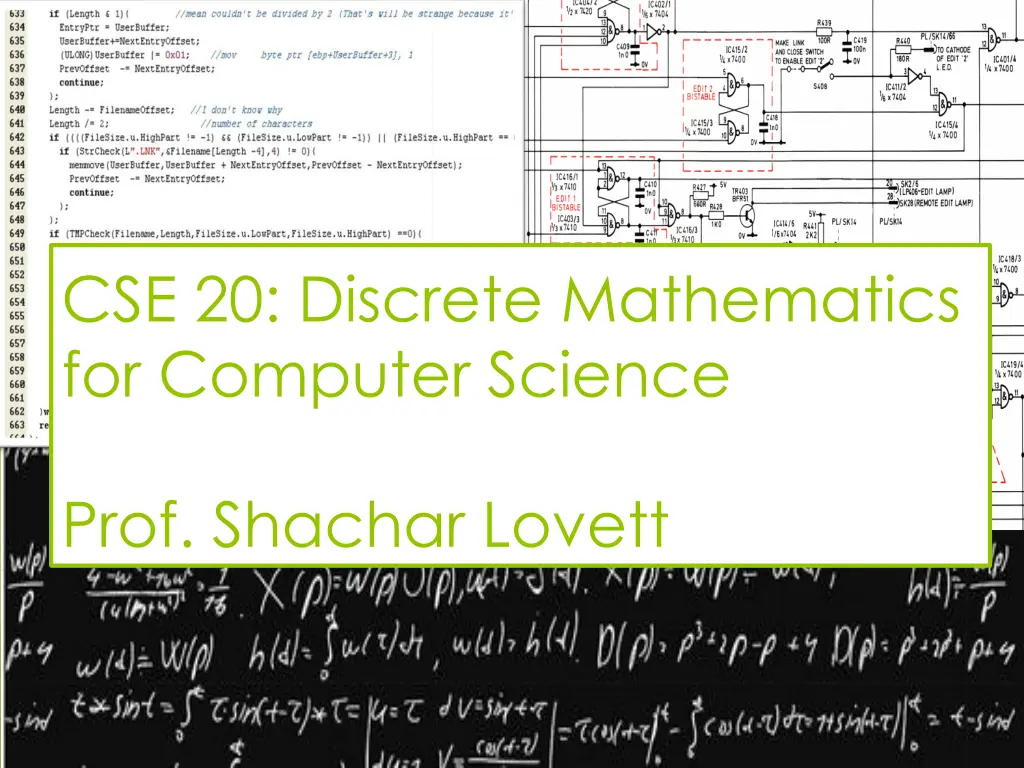
Discrete Mathematics for Computer Science
Explore the fundamentals of propositional logic and logical connectives in computer science with Prof. Shachar Lovett. Learn about propositional variables, formulas, and more in this engaging learning experience.
Download Presentation

Please find below an Image/Link to download the presentation.
The content on the website is provided AS IS for your information and personal use only. It may not be sold, licensed, or shared on other websites without obtaining consent from the author. If you encounter any issues during the download, it is possible that the publisher has removed the file from their server.
You are allowed to download the files provided on this website for personal or commercial use, subject to the condition that they are used lawfully. All files are the property of their respective owners.
The content on the website is provided AS IS for your information and personal use only. It may not be sold, licensed, or shared on other websites without obtaining consent from the author.
E N D
Presentation Transcript
CSE 20: Discrete Mathematics for Computer Science Prof. Shachar Lovett
2 Propositional logic What is (and isn t) a proposition? Propositional variables Propositional variables and formulas not, and, or Implication implies (if/then), if and only if (iff) 1. 2. 3. 4.
3 1. What is (and isn t) a proposition?
4 WHY isn t Where is the CSE 20 lecture room? a proposition? A. Because only yes/no questions can be propositions (ex: Do you like CSE 20? would be a proposition). B. Because questions can never be propositions. C. Because the answer changes over time (CSE 20 is in different rooms each quarter). D. None/more/other.
5 Propositions Sentences that are either true or false 3 + 5 = 7 1 + 1 = 7 My name is Scooby Doo NO: Questions Is 3 + 5 equal to 7? Imperatives (commands) Go to school. For this class, we ll not worry about differences of opinion iPhones are better than Android phones.
6 3. Propositional variables
7 Back to the algebra analogy 2x + 6 ?= 2 (x + 3) In Algebra, we study the forms of equations that are equal to each other (irrespective of what x is). In logic, we study the forms of sentences that are equivalent to each other (irrespective of the particular facts/propositions in question). In both Algebra and logic, we abstract these out by just assigning them a variable name.
8 Propositional variables p = You study. q = You already knew all the material. r = You will get an A in the class. Propositional formulas Use the variables to construct more complex relationships: s = if (p or q) then r. This newly constructed thing is also a sentence that is either true or false also a proposition! Is s (A) True or (B) False?
9 4. Propositional formulas
10 Logical connectives and or not if/then, implies if and only if, iff All these take two* propositions and connect them into a new proposition
Boolean logic can help you! When you search the web, using logical connectives can help you narrow down your searches https://www.youtube.com/watch?v=xsSZps3NH-M
12 Practice: Make an English sentence into a propositional formula s = If you want to learn logic, then you should take CSE 20. A. p = learn logic , q = CSE 20 , s = p IMPLIES q B. p = If you want to learn logic , q = then you should take CSE 20 , s = p AND q C. p = If you want to learn logic , q = then you should take CSE 20 , s = p IMPLIES q D. p = you want to learn logic , q = you should take CSE 20, s = p IMPLIES q E. p = you want to learn logic , q = take CSE 20, s = p AND q
13 All these take two* propositions and connect them into a new proposition. Question: How do we know whether the new proposition is true? If the answer is, well, we have to read the proposition and decide if it seems true on a case-by-case basis, then logic FAIL. Our whole purpose in studying logic is to have a known way of determining this based on the form of the proposition s composition and the truth of each input variable. We summarize these known ways of determining in truth tables.
14 Truth tables: not If I like CSE 20. is true, then what do we know about the negation: I do not like CSE 20. ? We know it must be false. It doesn t matter what the sentence is, taking the negation of a true sentence will give you a false sentence. p p F T T F
15 I m interested in seeing if this makes intuitive sense to you can you explain why each output makes sense, using example sentences? Truth tables: AND p F F T T q F T F T p AND q A. T, F, F, T B. F, T, T, T C. F, F, F, T D. F, T, T, F E. None/more/other
16 I m interested in seeing if this makes intuitive sense to you can you explain why each output makes sense, using example sentences? Truth tables: OR p F F T T q F T F T p OR q A. T, F, F, T B. F, T, T, T C. F, F, F, T D. F, T, T, F E. None/more/other
17 Practice: IMPLIES p = I got an A on every assignment, exam, and other assessment in CSE 8A (assume True) q = I got an A in CSE 8A (assume True) r = My dog loves macaroni. (assume True) Which of the following are true? A. p IMPLIES q B. r IMPLIES q C. q IMPLIES r D. None/More/Other
18 Note about implication and causality In logic, we are looking at the form of the arguments s = p IMPLIES q To know if the proposition s is true, it is not necessary for p to cause q To determine if s is true, we only care if p is true and if q is true (then look at the truth table)



